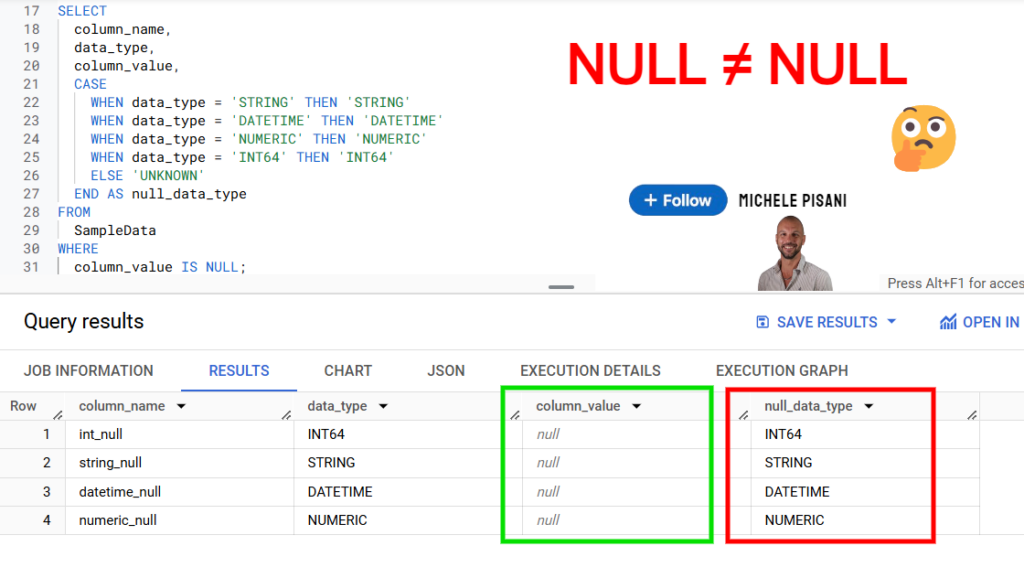Why You Should Pay Attention to NULLs in BigQuery and GA4
🚨 Not all NULLs are the same! 🚨
When working with BigQuery, especially with data from GA4 (Google Analytics 4), it’s crucial to understand a subtle but important concept: NULLs are not generic, they are tied to specific data types.

What does this mean in practice?
In BigQuery:
- A
NULLof typeDATETIMEis different from aNULLof typeSTRINGorNUMERIC. - This means that if not handled properly, these differences can lead to errors when combining or comparing values of different types.
For example:
-- This will throw an error!
WITH SampleData AS (
SELECT NULL AS int_null, CAST(NULL AS STRING) AS string_null
)
SELECT * FROM SampleData;
BigQuery requires that all types in a query be consistent.
Why does this matter for GA4?
GA4 uses a highly flexible event-based data structure where values can:
- Appear as
NULLif a field is not populated. - Change type dynamically (e.g.,
STRINGfor custom dimensions,NUMERICfor counts and metrics).
⚠️ Common pitfalls include:
- Direct comparisons between NULLs of different types causing errors.
- Challenges in creating combined reports if data types are not managed correctly.
How to handle this effectively?
Here are a few best practices:
- Standardize data types: Convert
NULLvalues to a common type (e.g.,STRING) to avoid errors. - Identify data types: Add explicit fields to track the original data type, as shown in the corrected query (see below).
- Monitor GA4 data: Carefully review dimensions and metrics to identify potential NULLs in your reports.
Correct query:
WITH SampleData AS (
SELECT
'int_null' AS column_name, CAST(NULL AS STRING) AS column_value, 'INT64' AS data_type
UNION ALL
SELECT
'string_null', CAST(NULL AS STRING), 'STRING'
UNION ALL
SELECT
'datetime_null', CAST(NULL AS STRING), 'DATETIME'
UNION ALL
SELECT
'numeric_null', CAST(NULL AS STRING), 'NUMERIC'
)
SELECT
column_name,
data_type,
column_value,
CASE
WHEN data_type = 'STRING' THEN 'STRING'
WHEN data_type = 'DATETIME' THEN 'DATETIME'
WHEN data_type = 'NUMERIC' THEN 'NUMERIC'
WHEN data_type = 'INT64' THEN 'INT64'
ELSE 'UNKNOWN'
END AS null_data_type
FROM
SampleData
WHERE
column_value IS NULL;Expected Result
Running the query above, you will obtain output similar to the following:
| column_name | data_type | column_value | null_data_type |
|---|---|---|---|
| int_null | INT64 | NULL | INT64 |
| string_null | STRING | NULL | STRING |
| datetime_null | DATETIME | NULL | DATETIME |
| numeric_null | NUMERIC | NULL | NUMERIC |
Why does this matter?
💡 Properly handling NULLs in BigQuery allows you to:
- Build more robust, error-free queries.
- Avoid unexpected results in GA4 reporting.
- Save valuable time troubleshooting complex issues.
💭 Have you ever encountered NULL-related problems when working with BigQuery or GA4? How did you solve them? Share your experience in the comments!
#BigQuery #GA4 #DataAnalytics #SQLTips #DataEngineering


 Digital Analytics Expert
Digital Analytics Expert HTML, CSS & JS Lover
HTML, CSS & JS Lover Apps Script Developer
Apps Script Developer Problem-Solving Oriented
Problem-Solving Oriented






Commenti recenti